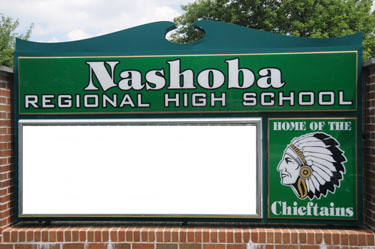
The Nashoba School Committee passed the proposed 2013/14 budget last night, minus about $443,000 in cuts agreed upon before the vote. Also taking center stage was another heated discussion over whether to scrap the district’s school choice program, and a look at how Nashoba is tuning up school security.
At the Committee’s request, at the last meeting administration laid out several levels of cuts it could make to trim the $49.1 million proposed budget. These cuts were placed in four tiers. Trimming a half-percent (tier 1) would mean, among other changes, tapping another $50,000 from the district’s free cash and cutting a planned technology position. Heavier cuts would come in the next three tiers, including reductions in existing staff.
Superintendent Michael Wood reported that, thanks to the federal budget sequester, the district is now anticipating up to a 6% reduction in estimated grants, and therefore suggested the Committee cut another $75,000 over whatever they were planning to trim. The Committee responded with several proposals, most of them centered on what Stow Rep. Jeff Odell termed “not touching instructional personnel, which I feel strongly about.”
After nixing several combinations of cuts, the Committee voted to accept the budget with tier 1 cuts, plus a few from other tiers. Among these are the proposal to replace the librarians at Hale and Luther Burbank (Lancaster) middle schools with instructional assistants. Objecting votes were cast by Stow Rep. Lynn Colletti and Rep. Kathy Owen of Lancaster.
Michael Wood said that the two librarians would be transferred to librarian openings anticipated at Center and Nashoba Regional High School.
However, the assessment for each district town is still not final. Because the district mistakenly reported more students in Bolton than enrolled, state aid may be adjusted, affecting how the assessments are distributed.
There will be a public hearing on the budget at the Committee’s March 24 meeting.
The Committee re-started the debate from its last meeting over school choice, with arguments continuing to heat up. Though Wood estimated the program made a net total of about $600,000 for the district last year from students choosing to attend school here, some Committee members continued to assert that the incoming students are crowding some schools, perhaps taking away opportunities from district pupils, and some towns may benefit over others.
A main point apparently frustrating everyone is that the state’s districts are barred from giving preference to current choice students’ siblings when distributing available seats. (Choice students are selected by lottery.) Committee Co-Chair Nancy Federspiel of Bolton said she confirmed with district legal counsel that, if Nashoba was to eliminate school choice for everyone except siblings of current choice students, “There is no case law or precedent that would allow us to do that.”
After several votes were taken on different proposals to modify the program—from keeping choice only at NRHS, to eliminating the program altogether — the only vote the Committee could agree on was to table the discussion until the next meeting. Even on this, there was a dissenting vote — from Odell, who remarked, “I just wanted to get it done tonight.”
Wood noted that the Committee has until May 1 to make any changes to school choice rules, or else the policy will remain the same for 2013/14.
Shoring Up School Safety
With school safety a prominent topic, it comes as no surprise that Nashoba is looking at how to tighten its own security measures. One result is the addition to next school year’s budget of a part-time school resource officer for Nashoba Regional High School.
The person’s primary focus will be what is described as “a visible and active law enforcement figure,” acting as the main liaison between the high school and the Bolton Police. Among the SRO’s responsibilities will be meeting with school administration multiple times per week; becoming a leadership resource to students; and gathering information regarding potential problems such as criminal activity, substance abuse, and safety concerns.
“There are so many times that if an SRO is at the school, they could respond to issues a lot faster,” said Bolton Chief of Police Vincent Alfano. He added that, when working in Framingham law enforcement, he saw firsthand the positive effects of having an SRO. Alfano said he already has a few officers in mind that he considers strong candidates.
Wood reported that Alfano already got Selectmen in Bolton to pledge to share 50% of the cost, which would total $22,000.
In another nod to safety, Nashoba will be hosting a panel discussion on student safety tonight, at 7 p.m., in Bolton’s Florence Sawyer School.
In actions voted, the Committee unanimously approved the proposed 2-year student bus contract, re-hiring First Student as bus company as of August. First Student’s bid was slightly under that from Dee Bus Service.
The Committee also voted in a new procedure for the superintendent’s evaluation; an updated policy on purchasing instructional materials; and approval of Nasoba’s fiscal year 2012, which shows a healthy financial picture for the district.